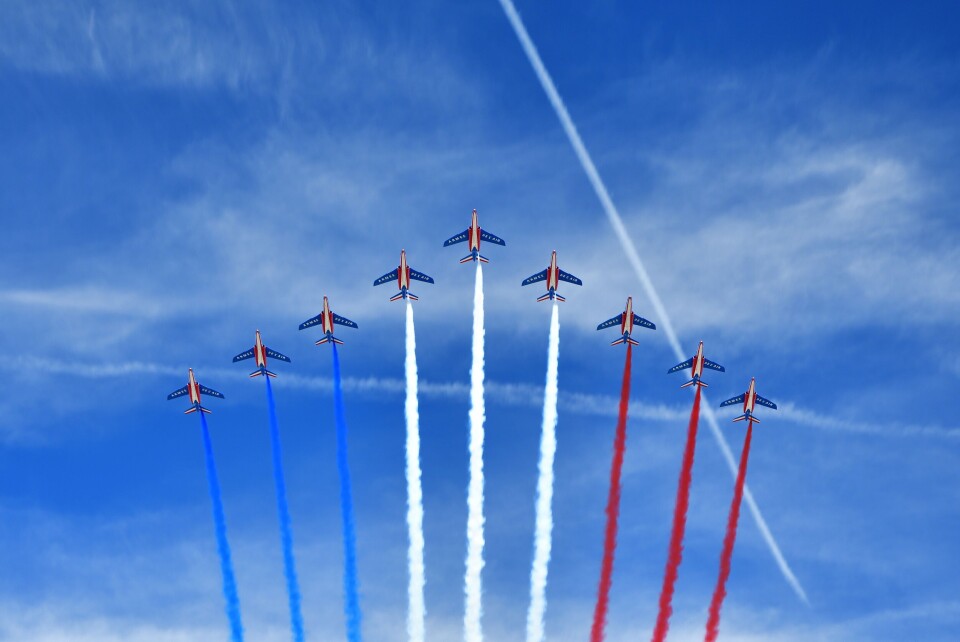-
Britons are the largest foreign community of second-home owners in Nouvelle Aquitaine
See which other departments in the region are popular with British nationals
-
Travellers risk extra costs under new Eurotunnel ticket rule
Some fare options are less flexible and less forgiving of lateness
-
May will be difficult month for train travel in France, warns minister
Two major train unions are threatening to strike and are ‘not willing to negotiate’, he says
France’s July 14 national day: What happens and why? What is new?
We take a closer look at France’s celebrations for la fête nationale

Friday (July 14) is a public holiday in France as the country pauses to celebrate its national day.
The event is seen as a celebration of France, especially the Republic. It is a concept perhaps alien to Britons but not Americans who are fresh from toasting their independence earlier this month.
The most important thing for anglophones to remember is not to call it Bastille Day. This is an anglicism. In France, the day is called la fête nationale or Le 14 Juillet.
The date has been a national holiday since 1880 when author Victor Hugo helped bring about a law to enshrine the day as a symbol of French liberty.
For some, it is as much a symbol of France as the tricolour flag or the national anthem, La Marseillaise.
What does it celebrate?
The date is tied to the French Revolution, which some say began on July 14, 1789.
With increasing national debt, a gulf in living conditions between rich and poor and a ruler unwilling to listen to the demands of the people, tensions were at breaking point towards the end of the 18th century.
King Louis XVI called the ‘Estates General’ – consisting of representatives of the nobility, clergy, and the ‘third estate’ (everyone else) – to his palace in Versailles to calm matters.
Royal troops moved from Paris to Versailles for the meeting, leaving Paris with few defences. Parisians angry over the dismissal of a key minister on July 11 started a rebellious call to arms.
On July 14, a group of rebels sacked Les Invalides for its weapons and marched to the Bastille prison and armoury – which housed gunpowder supplies.
The prison’s governor shot at the advancing crowd, leading to a bloody battle. Although only a handful of prisoners were being held in the Bastille its capture from royal forces was seen as a symbolic victory.
One year later, in 1790, the storming of the Bastille was celebrated at the Fête de la Fédération, which also saw a group of national guards (a citizens’ militia) from across the country organise a march on the Champ de Mars.
A law passed in 1880 officially declared July 14 as France’s national day, but did not specify whether this was in reference to the events of 1789 or 1790.
Read more: La Fête Nationale: 14 facts to know about le quatorze juillet
What happens each July 14?
Aside from being a holiday for most working people (some shops remain open, and public transport is still running – albeit finishing earlier this year), the day is known for its celebrations.
The most notable is the large military parade along the Champs-Élysées in Paris, where the French president makes an appearance.
Rarely, however, the parade takes a different path through Paris, such as in 1979, when soldiers paraded between Place de la Bastille and Place de la République.
The French president sometimes gives a speech on the day. This year, Emmanuel Macron has ruled that out, instead confirming that he will address the nation in the coming days.
On the evenings of July 13 and July 14 firefighters hold a special ball at their fire stations, which are often family-friendly events you can bring your children to.
Usually, towns and cities across France hold firework displays to mark the day, although this year there are expected to be fewer.
What is different this year?
A number of French towns and cities have declared this year they will use drones instead of fireworks for light displays.
This is a move to reduce waste, but also to lower the risk of fires, with many departments in France facing drought warnings.
It is also linked to sensitivities over recent urban violence in France that was triggered when a French police officer was charged with fatally shooting a 17-year-old boy – Nahel M. – during a traffic stop in the Parisian suburbs.
The violence saw fireworks set off often in the direction of the police, so they are not on sale to the public, by government decree, until after the July 14 festivities.
Read more: France bans fireworks for July 14 celebrations amid violence fears
Some towns across the border in Belgium have also restricted the sale of fireworks, to stop them being taken back across the border.
There will be 45,000 police officers on the streets on July 14, in a bid to maintain public order.
Buses and tramways across France – with minor exceptions – will stop at 22:00. In Paris, they will end an hour earlier at 21:00.
Read also
Firefighters, fêtes and forms: Key dates to know this July in France
Traffic and weather: What is forecast for France’s long weekend?
























